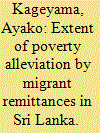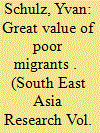| Srl | Item |
| 1 |
ID:
080819


|
|
|
|
|
| Publication |
2008.
|
| Summary/Abstract |
After reviewing some of the available empirical literature on current trends of remittances and their economic impact on welfare of migrating countries, this study focuses on the case of Sri Lanka to demonstrate that workers' remittances may have both positive and negative consequences in home communities. Economically, remittances will benefit migrant households, particularly poorer ones, by increased income in the short term. However, they may sometimes cause negative social effects, particularly through disruption in family relations and also by creating a sense of relative deprivation in non-migrant communities. Therefore, migration and remittances are not the sole solution of poverty alleviation and appropriate policies also need to address unexpected adverse effects
|
|
|
|
|
|
|
|
|
|
|
|
|
|
|
|
| 2 |
ID:
155720


|
|
|
|
|
| Summary/Abstract |
Unskilled migrant workers and their families represent a crucial human resource in Sabah (Malaysia) as cheap labour, but also as religious believers. Christian organizations belonging to various denominations have started to cater to this community in recent years by providing educational services. Based on an ethnography of two schools led by charismatic South Korean missionaries and patronized by a Lutheran church with roots in Sabah, this article argues that ‘salvation’, as it is understood and practiced through education in these institutions, falls short of empowering migrants as a whole and rather contributes to reproducing their subordination as a community within Sabahan society.
|
|
|
|
|
|
|
|
|
|
|
|
|
|
|
|